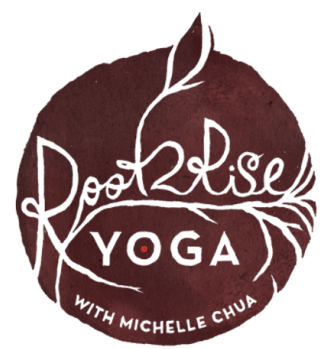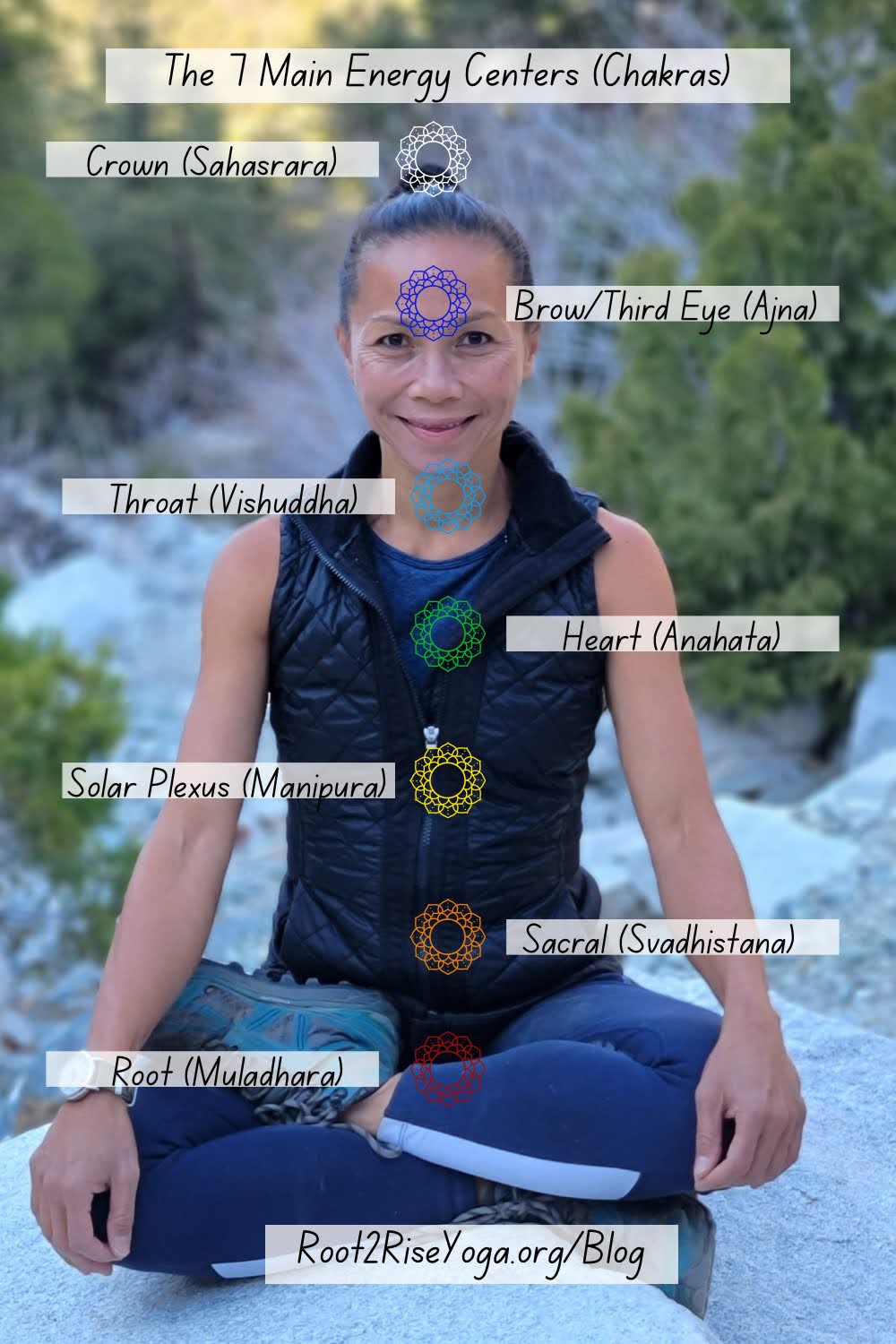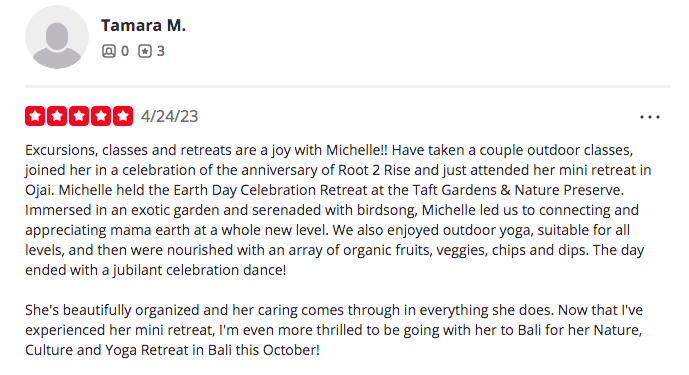|
Written by Michelle Chua Why and How I Came to Learn About ChakrasThrough past physical and emotional injuries, I’ve grown to believe in the inseparable relationship between my thoughts, emotions, energetic state and physical wellbeing. However, it took many years of studying yoga to finally dive deeper into the exploration of chakras, succinctly defined as energy centers in the body. I admit I had a slight aversion to using this word for a while, as it’s been a trendy buzzword in the modern Western yoga circles and has unfortunately been dismissed by some as woo woo. However, studying the chakras with an open mind can provide practical insights for optimizing your well being on many levels. As I sought to deepen my yoga practice years after I first tried yoga in 2001, I grew interest in understanding chakras and how such knowledge might empower my personal practice, and now as a yoga teacher, help me facilitate more informed multi-dimensional practices for my students and clientele. When the pandemic hit California in spring 2020, energetic turbulence clouded my mind and body. Repeated trail-running injuries drew me to investigate how my specific thought patterns, intense emotions and chronic injuries were related. I researched psychology literature online and read books by mindfulness teachers. I met with intuitive energy healers (from reiki to pranic healing and mindset coaching), dove into trauma-informed yoga courses and eventually graduated from a neuroscience-backed 300-hour Yoga Psychology certification program that focused largely on the chakras and their connection to mind-body-spirit healing, including for traumas rooted in childhood and ancestry. Most intimately, I integrated what I was learning into my daily self-care and experienced directly how chakra-informed yoga affected my layers of self—from physical to spiritual. I’m deeply thankful for this journey and what it’s taught me, so I’m inspired to share basic chakra information as practically applicable as I can from my experience, research and teachers. Human Energy Centers Across Cultures Physicist Albert Einstein (1879-1955) famously concluded, “Everything is energy and that’s all there is to it. Match the frequency of the reality you want and you cannot help but get that reality. It can be no other way. This is not philosophy. This is physics.” Greek Physician Hippocrates (ca. 460 bce—ca. 370 bce) believed that body and mind are a unity, and to affect one is to affect the other. Different cultures have similar teachings about the mind-body connection and energy centers within the human body that affect mental, physical, emotional and spiritual health. Mayan culture named chaclas as force centers in the body and kultunlilni as the life energy and the power of consciousness, spurring human growth and development. (See Similarities between the Hindu and the Maya Culture) In ancient Egypt, an energy healing practice called sekhem, worked to harmonize and balance a person’s physical, mental, emotional and spiritual wellbeing through energy centers. (See Sekhem - A Form of Ancient Egyptian Healing) Chinese Medicine names six yang and six yin main meridians, or complimentary channels of qi, or life force energy, in the human body and promotes healing through balanced energy flow through them. (See Traveling the Energetic Highway: What are Meridians?) These are some globally impactful cultures that have parallel systems to the chakras. Perhaps you know of others? Chakras: Brief History and Definitions According to Tantric Academy, the notion of chakras originates from about 2700 years ago and was first mentioned in sacred Hindu texts, called Upanishads, in 700-800BCE. However, knowledge of the chakra system was most likely passed down through oral tradition prior to written recordings. According to my teacher Ashley Turner’s research in Yoga Psychology, chakra is a center of activity that receives, assimilates and expresses life force energy. Its literal translation from Sanskrit is “wheel” or “disc” and “denotes a point of intersection where mind and body meet,” according to Anodea Judith, PhD, author of Wheels of Life: The Classical Guide to the Chakra System. Anodea explains, “To work with the chakras is to heal ourselves of old constricting patterns lodged in the body or the mind, or habitual behavior.” Through the lens of Developmental Psychology, Ashley conveys that the vitality of each chakra is affected by how a person has digested their experiences within a correlating phase of their human development and that each chakra links to specific glands of the endocrine system, affecting their bio-chemistry. Spiritual teacher, Shai Tubali, drew an insightful parallel to the wellness needs of each main chakra to each stage of Psychologist Maslow’s Hierarchy of Basic Human Needs—from food and safety to self-actualization. While a human’s energy body, named Pranamaya Kosha in yoga philosophy, contains over 70,000 nadis, or energy channels, a compounding number intersect at seven main points that lie along the spine, and these are the 7 main chakras I will focus on describing next. Overview of the 7 Chakras“Understanding the chakras gives us self-knowledge at every level of our being,” wrote Sandra Anderson in Yoga International, “The chakras govern our behavior, shape our emotional life, give expression to our deepest desires, and build the structure of our physical body and personality.” Whether or not you fully subscribe to the details about chakras, consider the following information as an invitation to look into these various aspects of your life when tending to your whole wellbeing. Here’s a brief overview of each main chakra, its physiological location, its mind-body characteristics when in balance, it’s associated endocrine gland, the developmental stage that highly influences its health and a few practical ways to cultivate its wellness: 1. Root Energy Center (Muladhara Chakra) spins at the base of the spine and offers a sense of safety, belonging and feeling supported in all aspects of life, including feeling connected to Mother Earth and to your physical body. It’s linked to the adrenal glands, which spurs us into fight or flight reactivity when we perceive that our sense of survival is threatened. It’s highly influenced by the experiences you had as early as when you were a fetus in the womb through 12 months after birth, affecting physical growth, motor skills and sense of object permanence. Cultivate balance at your root energy center by regularly spending quality time in nature-- mindfully breathing, earthing with bare feet, preparing your meals with your hands using whole foods from the earth, running, walking, hiking, gardening, swimming or practicing grounding yoga. 2. Sacral Energy Center (Svadhistana Chakra) spins at the area of the sacrum or lower back and lower belly. It gifts the ability to trust our emotions as guides, adapt to change, honor our sexuality and sensuality and play in life’s flow. It’s related to the ovaries and testes, sexual organs of reproduction. It’s greatly affected by your experiences during 6 to 24 months old, characterized by sensate exploration of the world and beginning locomotion. Support its health by practicing moving your body with ease and fluidity and enjoying healthy sensual pleasures, like eating delicious meals, dancing, playing and having meaningful conversations with friends and loved ones. 3. Solar Plexus Energy Center (Manipura Chakra) spins at the upper abdominal/middle back region. It provides our fire for action towards our vision and soul purpose, ability to digest life situations and extract the “nourishment” needed for our continued evolution and ability to tame our ego and feel genuinely confident. It’s connected to the adrenals and pancreas. The latter helps digest food and manage your body’s use of sugar for energy after digestion. It’s affected by your development during 18-42 months old, when you’re initially establishing a sense of separateness and autonomy, like learning to say, “mine” and “no.” Nurture its wellbeing by building self-trust and confidence, facing your fears and decluttering your life and home of what no longer serves your highest wellbeing. 4. Heart Energy Center (Anahata Chakra) spins at the middle of the chest and upper back. It balances our giving and receiving of unconditional love, our essence or true nature, and enables forgiveness, compassion and pure joy. It’s associated with the thymus gland, which helps the body fight infection and is a part of your immune system. It’s largely affected by your experiences during 3.5 to 7 years old, in which you’re forming loving peer and family relationships and developing persona. Balance energy here through regular yogic breathwork, practicing forgiveness and compassion, singing and laughing, connecting with other beings or animals and allowing yourself to experience joy daily. 5. Throat Energy Center (Visuddha Chakra) spins at the throat and offers the ability to communicate with clear intent and loving kindness, listen with empathy and express yourself creatively. It’s associated with your thyroid, which regulates metabolism, and parathyroid, which affects calcium levels in your blood. It’s highly influenced by your experiences during 7-12 years old, especially focused on your speaking and hearing truth. Cultivate its health by voicing your truth, singing and chanting, journaling, establishing healthy boundaries by saying “no” when you need to, exploring creative means of expression through art and practicing whole-being listening to understand others’ feelings and needs when they’re communicating to you. 6. Third Eye or Brow Center (Ajna Chakra) spins at the center of the forehead and gifts connection to inner guidance, ability to see past delusions, including false inner narratives, and wise discernment to see the bigger picture of your spiritual journey amid challenging situations. It’s associated with your pineal gland, which produces melatonin, regulating your circadian rhythm. It’s highly affected by puberty and establishing personal identity and perceiving patterns in life. Nurture its wellbeing through regular meditation, developing a regular spiritual practice, practicing gratitude, journaling about your dreams, creating or viewing visual art, listening to music, strengthening your connection to your intuition and visualizing. 7. Crown Energy Center (Sahasrara Chakra) spins at the crown of the head and gifts an internalization of the knowledge that all is connected. It’s connected to your pituitary gland, considered the “master gland” in that it regulates the many other endocrine glands throughout the body and affects vital parts like your brain, skin, energy, mood, reproductive organs, vision, growth and more. Its health is greatly affected throughout the stages of life in your assimilation of knowledge and development of wisdom. Cultivate its vitality by meditating daily, practicing compassion for yourself and all of life, reading wisdom texts by inspiring spiritual teachers, spending regular quality time with nature and sharing your joy with others. This information is a concise compilation of key points to acquaint you with general qualities of each of the seven chakras. Most importantly, observe, experiment and reflect on how these suggested practices or your current daily doings and interactions affect you physically, mentally, emotionally and energetically. Are there any impactful events you experienced during your specific developmental stages that may continue to affect your overall health? Do you experience patterns of high or low energy in certain aspects of your being or life? Do you notice any patterns of thoughts and beliefs related to patterns in your physical wellbeing or relationship with others? Self-study is an important practice of yoga and maintaining whole-being wellness. And, chakra-informed and skillfully sequenced yoga—from poses, movements, breathing techniques, meditations and life applications—can help address certain conditions of mind-body and invite balance into certain chakras. May this knowledge contribute to your leading a conscious, happy, healthy and fulfilling life, as you nourish yourself at every level of your being and ripple that thriving presence into our world! Explore natural lifestyle habits that help balance your 7 chakras at our upcoming Women's Wellness Retreat, Thrive Together, on May 6-9, 2022 in Santa Rosa Plateau, CA with Michelle Chua.
0 Comments
Leave a Reply. |
A Collective Blog about Yoga Lifestyle & Inspiration
|
REviews of Root 2 Rise Yoga with Michelle chua:Michelle truly lives out what she teaches. She is so much more than a yoga teacher - I learned this when I went on her exquisitely curated trip that she organized to Costa Rica this past June 2018...Hopefully like me, you'll be delighted by her effervescent love of movement, nature, and all people! Michelle clearly stands out with her beautiful and bright energy. I love how her practice and teaching encompass body, mind and spirit. She not only teaches yoga but lives and exudes it. Michelle not only teaches 'yoga', she embodies it fully with her heart and soul... Michelle is by far one of the best instructors I've ever had, period. Patient, clear in her explanations and demos, and so encouraging... My first yoga class was with Michelle years ago. You can have the best (yoga pose) sequence and not teach from your heart. With Michelle, I also feel her passion when I'm in her class. I can see she loves what she does, and she inspired me to want to teach yoga, too. |
Let's connect:Now offering private reiki sessions for stress relief and healing.
I'm so grateful to have met Michelle! Her kind energy opened up my interest in pursuing yoga and meditation. She is such an incredibly light and soul. She starts with grounding ourselves through mindfulness and breathing exercise. She brings the most authentic energy to the class by sharing the history and understanding behind poses, names, and techniques. I truly appreciate her work and impact on my well-being! I’ve had dozens of instructors over the years, but Michelle is far and away the best yoga mentor I’ve ever practiced with. She epitomizes grace during these difficult times. Michelle has saved my sanity and my back while working from home, keeping me grounded with her sharing of yogic teachings and meditation techniques. Her repertoire of physical asanas is encyclopedic, and I’ve loved learning new poses and stretching my boundaries. Jump in, all. You’ve got this! |
©2010 Root 2 Rise Yoga


 RSS Feed
RSS Feed

